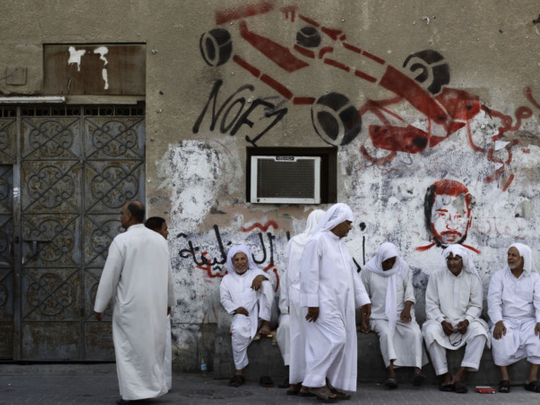
Dubai: Bahrain vowed on Sunday to take “appropriate” security measures after a series of explosions raised security fears ahead of the kingdom’s premier international sporting event, the F1 Grand Prix motor race, scheduled for this weekend
The interior ministry said on Monday it would boost security after militants ignited a gas canister in a car in the central commercial district of the capital late on Sunday.
The blast outside the Bahrain Financial Harbour was accompanied by three other explosions on the outskirts of the capital Manama, with the February 14 youth movement claiming responsibility for the attacks, saying it was aimed at disrupting “activity in Manama’s financial centre in opposition to holding the Formula One race”, and pledging “more operations”.
Radical youths are agitating against the high-profile motor racing event two years after the government put down widespread pro-democracy protests inspired by the Arab spring uprisings.
The government also confirmed that a car had burst into flames in the expatriate-dominated Juffair neighbourhood of the capital on Friday night, but it declined to give a reason for the fire.
The car was parked outside a nightclub popular with foreigners and sailors from the nearby US naval base.
Officials have downplayed the incident, which the interior ministry has not designated as a “terrorist incident”.
Bahrain “will ensure that appropriate security measures are taken during the F1 race and will take enough measures as in all other countries which host such international sporting events,” government spokeswoman Sameera Rajab said.
“The security situation in Bahrain is very reassuring,” she said, quoted by state news agency BNA.
Her remarks came as witnesses said thousands took to the streets in Dair village near Manama international airport demanding the ouster of the government - led for decades by Shaikh Khalifa bin Salman Al Khalifa.
No clashes were reported.
Formula One supremo Bernie Ecclestone dismissed concerns over the Bahrain Grand Prix.
“Yes. There’s no reason why it shouldn’t be (a success),” Ecclestone said at the Chinese Grand Prix in Shanghai.
Under the banner “Democracy is our right,” the mainly Shiite opposition is organising a week of protests that began on Friday to coincide with the April 19-22 Grand Prix in Bahrain.
The major Shiite opposition bloc Al Wefaq is planning a demonstration on April 19, as the event kicks off on the Sakhir circuit south of the capital.
And on Monday (today), authorities said a “terrorist group” used a gas cylinder to blow up a car overnight in Manama. Nobody was hurt in the explosion.
The radical youth February 14 Movement claimed responsibility for the blast on Twitter, saying it was aimed at disrupting “activity in Manama’s financial centre in opposition to holding the Formula One race”.
On Saturday, clashes between protesters and police erupted as thousands demonstrated across several villages, urging reforms.
Police fired buckshot and tear gas, severely wounding a 14-year-old boy in the face, according to Al Wefaq, which warned that “escalation and violence by the [government] against the people ... demanding democracy will fail.”
The Shiite bloc said on Sunday that 98 people have been arrested so far this month and 31 others wounded in clashes with police.
According to Human Rights Watch, police have been rounding up pro-democracy activists in bid to head off protests over the Gulf state’s hosting of the Formula One.
Last year’s Bahrain Grand Prix went ahead as police responded to protesters throwing petrol bombs by using tear gas, sound bombs and birdshot.
Bahrain was rocked by month-long pro-democracy protests led by the opposition in early 2011 that were put down.
Protests have continued in villages outside the capital. Human rights groups say a total of 80 people have been killed since February 2011.
- with inputs from the Financial Times












